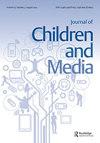Grandsharenting: How grandparents in Belgium negotiate the sharing of personal information related to their grandchildren and engage in privacy management strategies on facebook
IF 2.1
3区 心理学
Q2 COMMUNICATION
引用次数: 2
Abstract
ABSTRACT Sharenting, the practice whereby parents disclose information about their children on social media, is ubiquitous in our digital society. Even though grandparents take on a considerable role in their grandchildren’s lives and use social media, little is known about grandparents’ sharenting behavior (i.e., grandsharenting). This study explores grandparents’ motives for grandsharenting and privacy management strategies using Communication Privacy Management theory. Based on 17 interviews with grandparents (Facebook users aged between 52 and 83) in Flanders (Belgium), six motives for grandsharenting were identified: informing others about their grandchildren’s development; interacting with other grandparents; giving advice; role confirmation; showing pride towards their grandchildren or happiness of being a grandparent and saving memories. Grandparents indicated they cared about their grandchildren’s digital identities and applied cost-mitigating strategies to protect grandchildren’s privacy. Although cost-mitigating strategies varied by the grandchild’s age, respondents said to consider the content they post, to ask permission to their grandchild before sharing information to respect privacy boundaries and to avoid privacy turbulence. As only grandparents with minor grandchildren were interviewed, parental involvement was deemed important. Grandparents intervened when they experienced grandchildren’s privacy had been violated. Findings contribute to research on privacy regulation, impression management and intergenerational relations in a digital landscape. IMPACT SUMMARY Prior state of knowledge: Research on sharenting predominantly focuses on the motives for parental sharenting and outlines the privacy risks sharenting contains. Moreover, in line with Communication Privacy Management theory, research lays bare the cost-mitigating strategies parents adopt to protect their child’s privacy online. Novel contributions: As grandparents often take on a considerable role in their grandchildren’s lives and increasingly use social media, this study contributes to communication and family studies by investigating grandparents’ motives for sharenting and by examining how they engage in privacy management. Practical implications: We recommend grandparents to discuss their grandsharenting behavior with their grandchild or the parents of the child before sharing content about the grandchild on social media. Moreover, we encourage grandparents to respect privacy rules in order to avoid intra-familial conflict.grandsharenning:比利时的祖父母如何协商分享与孙辈有关的个人信息,并在facebook上参与隐私管理策略
在我们的数字社会中,父母在社交媒体上披露孩子信息的行为无处不在。尽管祖父母在孙辈的生活中扮演着相当重要的角色,并使用社交媒体,但人们对祖父母的育儿行为(即孙辈育儿)知之甚少。本研究运用通信隐私管理理论,探讨了祖父母代劳的动机及隐私管理策略。通过对比利时法兰德斯(Flanders)的17位祖父母(Facebook用户年龄在52岁至83岁之间)的采访,研究人员确定了养育孙子孙女的6个动机:告知他人孙子孙女的成长情况;与其他祖父母互动;提供建议;角色的确认;表现出对孙子孙女的骄傲或作为祖父母的快乐,并保存记忆。祖父母们表示,他们关心孙辈的数字身份,并采取了降低成本的策略来保护孙辈的隐私。尽管降低成本的策略因孙子孙女的年龄而异,但受访者表示,他们会考虑发布的内容,在分享信息之前征求孙子孙女的许可,以尊重隐私界限,避免隐私动荡。由于只有带着年幼孙辈的祖父母被采访,父母的参与被认为很重要。当祖父母发现孙辈的隐私被侵犯时,他们会介入。研究结果有助于研究隐私监管、印象管理和数字环境中的代际关系。先前的知识状态:关于分享的研究主要集中在父母分享的动机和概述分享所包含的隐私风险。此外,根据通信隐私管理理论,研究揭示了父母为保护孩子的在线隐私而采取的降低成本的策略。新颖的贡献:由于祖父母通常在孙辈的生活中扮演着相当重要的角色,并且越来越多地使用社交媒体,本研究通过调查祖父母分享的动机以及他们如何参与隐私管理,为沟通和家庭研究做出了贡献。实践启示:我们建议祖父母在社交媒体上分享关于孙子的内容之前,与孙子或孩子的父母讨论他们的孙辈行为。此外,我们鼓励祖父母尊重隐私规则,以避免家庭内部冲突。
本文章由计算机程序翻译,如有差异,请以英文原文为准。
求助全文
约1分钟内获得全文
求助全文

 求助内容:
求助内容: 应助结果提醒方式:
应助结果提醒方式:


